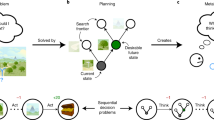Abstract
This paper presents a human behavior model of problem solving where information is deliberately incomplete and is to be obtained by the execution of some actions. This model is based on an experimentation set up with psychologists and simulates the observed behavior as faithfully as possible. We show how it allows a modular implementation with opportunistic aspects.
Preview
Unable to display preview. Download preview PDF.
Similar content being viewed by others
References
Engelmore and Morgan, Blackboard Systems, Addison-Wesley Publishing Company, 1988.
Hayes-Roth and Hayes-Roth, “A cognitive model of planning”, Cognitive Science, vol 3, 1979, pp. 275–310.
Newell and Simon, “GPS, a program that simulates human thought”, in Feigenbaum, E. A. and Feldman, J. eds Computers and Thought, 1963, pp. 279–293.
Tate, Hendler and Drummond, “A review of AI planning techniques”, in Readings in planning, Allen, Hendler et Tate, Morgan Kaufman Publishers, Inc, San Mateo, 1990, pp. 26–49.
Terry, “The CRYSALIS Project: Hierarchical Control of Production Systems”, Technical Report HPP-83-19, Heuristic Programming Project, Computer Science Department, Stanford University, 1983.
Author information
Authors and Affiliations
Editor information
Rights and permissions
Copyright information
© 1995 Springer-Verlag Berlin Heidelberg
About this paper
Cite this paper
Chaignaud, N. (1995). A cognitive model of problem solving with incomplete information. In: Pinto-Ferreira, C., Mamede, N.J. (eds) Progress in Artificial Intelligence. EPIA 1995. Lecture Notes in Computer Science, vol 990. Springer, Berlin, Heidelberg. https://doi.org/10.1007/3-540-60428-6_40
Download citation
DOI: https://doi.org/10.1007/3-540-60428-6_40
Published:
Publisher Name: Springer, Berlin, Heidelberg
Print ISBN: 978-3-540-60428-0
Online ISBN: 978-3-540-45595-0
eBook Packages: Springer Book Archive




